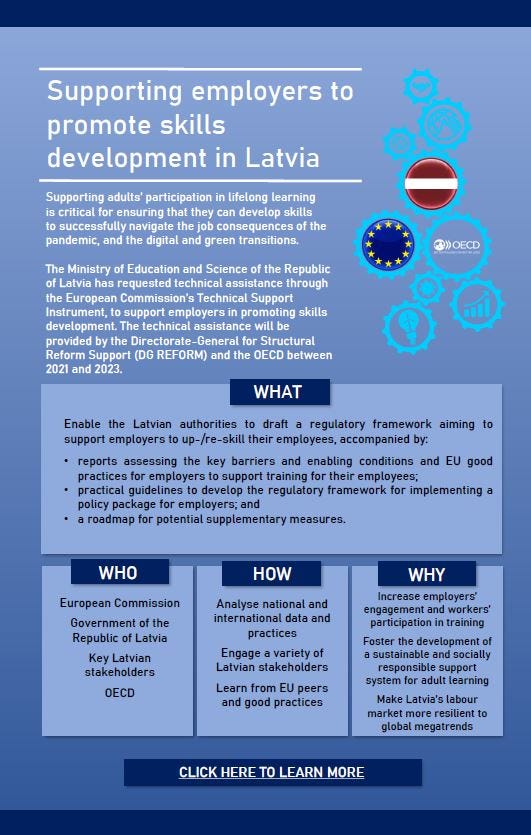The importance of investing in skills development is growing for Latvia. Globalisation and the digital and green transitions are transforming jobs, how societies function and how people interact. The pandemic has accelerated the digital transition, showing the urgent need for resilient labour markets based on an increased adaptability of individuals to gain new skills. At the same time, skills imbalances (especially shortages of digital skills) hold back the capacity of Latvian firms to innovate, adopt advanced technologies and promote productivity.
Supporting employers to promote skills development in Latvia
The OECD Directorate for Employment, Labour and Social Affairs, the OECD Centre for Skills, and the Directorate-General for Structural Reform Support (DG REFORM) of the European Commission, are co-operating to provide technical support to Member States through the Technical Support Instrument.
The project "Supporting employers in promoting skills development in Latvia" aims to support the Ministry of Education and Science of the Republic of Latvia to improve the regulatory framework that supports investment in skills development by employers, by developing a policy package including financial and non-financial measures.
Context
The challenge
Notwithstanding these trends, the level of participation in adult learning in Latvia remains relatively low. Only 6.6% of adults reported participating in education and training over a four-week period in 2020, compared to the EU average of 9.2%. Employees’ participation in training is highly dependent on the will of their employers, but enterprises in Latvia lag behind their European counterparts in providing re-/up-skilling opportunities for their employees. Enterprise investment in continuous vocational training as a percentage of total labour cost in Latvia (0.8%) is the lowest in the EU, well below the EU average (1.7%). Only 35% of employees participate in education activities during paid working hours. Moreover, micro and small-sized enterprises, which employ approximately 57% of the Latvian labour force, have less capacity to provide employee training than large firms.
Project relevance
Against this backdrop, this project links directly to the national priorities of Latvia to develop a sustainable support system for adult learning. The project aims to provide technical assistance to the Latvian Ministry of Education and Science in the development of support measures for employers to invest in the skills of their employees. The Latvian Law on Education already foresees the need to introduce such measures, but the regulatory framework describing the eligibility criteria and the implementation procedures will only be introduced by the end of 2022, as a milestone of Latvia’s Recovery and Resilience Plan (RRP). This project will enable the Latvian authorities to further improve the regulatory framework, by developing a policy package including financial and non-financial measures to support employers. This will contribute to the implementation of the reform on the “Development of a sustainable and socially responsible support framework for adult learning” in the RRP (Reform 2.3), which aims to increase adult learning participation and facilitate reaching other targets set in the Education Development Guidelines 2021-2027. The project is also in line with the EU priorities on a green and digital Europe, key principles of the European Skills Agenda, the European Pillar of Social Rights and the Sustainable Development Goals.
Project outputs and activities
The project will involve extensive consultations with Latvian stakeholders, in-depth data and policy analysis, and peer-learning from best practices in countries facing similar challenges. These analyses, consultations and peer learning will result in:
- a comprehensive assessment of the key barriers and enabling conditions for Latvian employers to invest in the skills of their employees (Q2 2022),
- the identification of international best practices to encourage employers to invest in the skills of their employees (Q3 2022),
- practical guidelines to enable Latvian authorities to improve the regulatory framework to support employers’ investment in up-/re-skilling their employees (Q2 2023),
- a methodology and monitoring indicators to evaluate the implementation of the introduced support measures (Q3 2023), and
- a roadmap to help implement and complement the policy recommendations (Q3 2023).
The project is expected to conclude in September 2023.
Key resources
- Report: Assessing the key barriers and enabling conditions for employers to invest in skills development in Latvia (full report in English, summary in Latvian)
- Report: Good practices in Europe for supporting employers to promote skills development (full report in English, summary in Latvian)
- Report: Describing the policy package for the regulatory framework to help employers investing in skills (full report in English, summary in Latvian)
- Guidelines: Practical guidelines for the regulatory framework (full guidelines in English, summary in Latvian)
- Report: Indicators and methodology for monitoring the implementation of the support measures (full report in English, summary in Latvian)
- Report: Supporting employers in promoting skills development in Latvia: Roadmap for potential supplementary measures (full report in English, summary in Latvian)
The Project "Supporting employers in promoting skills development in Latvia" was co-funded by the European Union via the Technical Support Instrument (REFORM/IM2021/009) and implemented by the OECD, in co-operation with the European Commission’s Directorate General for Structural Reform Support. These reports were produced with the financial assistance of the European Union. The views expressed herein can in no way be taken to reflect the official opinion of the European Union.

